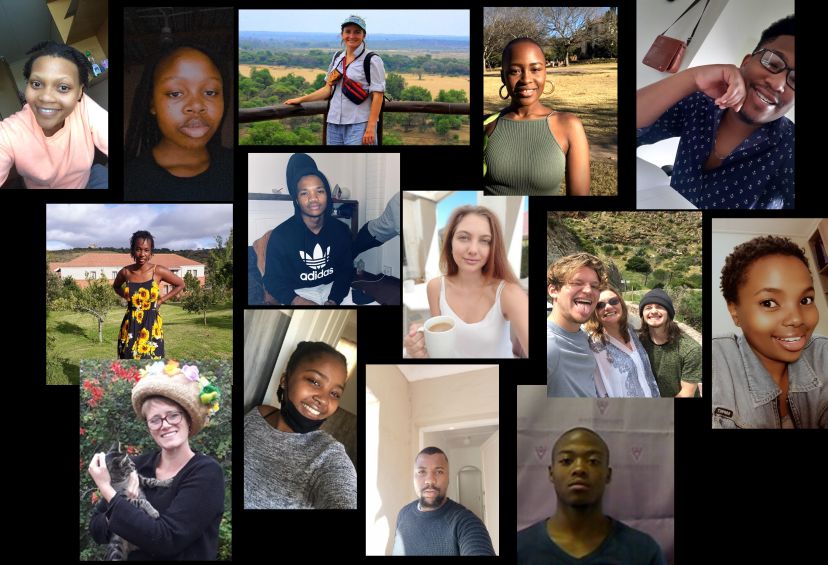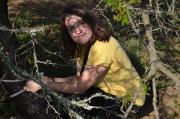
While the Department of Environmental wasn't out and about much and so we didn't generate much news, it was still a big year for us all. Here we share our stories of learning in lockdown, reflecting on the highs and lows and lessons learnt during the difficult transition to working at home during the COVID-19 pandemic in 2020. No doubt you too will have your own story of learning in lockdown -- connect with us on Twitter to share: @DESRhodes1

Kamogela Maraba (3rd year)
Highs of online learning were the constant communication and being able to pause and write notes while listening to the lectures or go back made it easier to get the picture being presented. Lows, the constant communication, it made it feel like we never had an off like we had to be working all the time. The most important thing I learned is that it can be done, not my favourite method of learning there are a lot of perks with face to face but online did stretch out perseverance and independence.

Karabo Lamola (2nd year)
Some of my highlights include being able to write my exams and assessments without any time constraints. I do not work well under pressure and so being given 24hours to complete one exam really helped me cope better with exams and would be the reason if I get high marks. The lows were so many, considering that it was the first time I had to work towards a university degree online. The transition was quite rough, after adjusting to that the academic year was rushed and so I was chasing deadlines but not quite learning anything. The material was quite overwhelming and it had to be covered in such a short time frame, this was the breaking point for me. It got too much and I felt like I was just fighting to survive, just to stay afloat for the next submission.
A lesson that I felt was most important was that discipline is very important; designing a work schedule and sticking to it will help with a lot of pressures. Many might think just because you are home and have no strict timetable, then you have ample time which is false because if you mismanage your time you might find yourself left with little to no time for school. So time management and discipline are very important in online learning and they work best when implemented together.

Kelly Bernard (Honours)
The highlights of online learning were being able to work from home and set my own timetable for each day, which meant that I could walk the dogs, go for runs, and do housework in between my studies. It was a nice opportunity to create a holistic lifestyle for myself. The biggest challenge of online learning for me was to overcome the isolation of social distancing and working alone from home, which I did by keeping in touch with friends and family over the phone. One of the most important things that I have learnt this year about learning online is the importance of keeping myself accountable to the targets that I set so that I get my work done to a high standard, while still finding time for nature, enjoyment and exercise! A balanced lifestyle is key to success and happiness!

Luxolo Kuhlane (3rd year)
The accessibility to online lecture videos helped me a lot, preparing for exams, I went back and listened to the videos again and that helped a lot. Effective communication between lecturer and students was absolutely amazing, whenever I had a problem, my problem would be attended to very quickly. Online learning allowed me to study and attend lectures in the comfort of my own room. It took away the stress of having to wake up early in order to make it for your early lectures. Online learning allowed me to work at my own time and pace, it taught me self-discipline and time management.
The start of online learning was a bit of a struggle for me. I found it hard to engage with the online material, the main issue being the fact that I struggled with an unstable internet. Engaging with online learning at home was a problem. There are many disturbances at home which resulted in me not being able to fully concentrate effectively with my work. The zoom calls also became a barrier as they resulted in half of the Rhodes data being used up by them. I am not a student who enjoys to study at night, online learning resulted in me having to stay up in order to make use of night data. Time management and schedules are very important in online learning. One thing I can take away from online learning is that it motivated me to push myself and it helped me build self-discipline.

Milani Ngxokela (2nd year)
Personally, I enjoyed studying in the comfort of my home surrounded by my family. However, I would like to speak on the benefits of online learning which constitutes the highlight of online learning. With online learning, lectures were recorded and posted online so that we can access them whenever we needed to, this brought about flexibility in terms of learning compared to our normal lectures, we were able to rewind the recordings if we had missed some points and also go back to them for revision. In addition, online learning enabled us to continue learning without getting in contact with the virus.
Because learning was now moved online and as much as the school tried providing data for us , the data was sometimes not enough. Some of us live in remote areas where internet connection is bad, this made it hard for us to fully participate in the day to day online studies. Secondly, I had troubles with fully engaging with some of the topics that were taught because I needed further explanation or examples that I could relate to (some of us come from backgrounds that are not familiar with some of the sciences) but I did not know how to phrase my questions and I personally feel that it would have been best if we had our normal classes. Online learning teaches Resilience, that we should learn to adapt to the changes of the world. This transition taught me that I should broaden my learning techniques.
Engaging in different ways with students was one of the highlights for me: getting to know some of the students in my class on a more personal level via WhatsApp was rewarding and made it easier for me to cope with all the uncertainties and worries that came with teaching under lockdown. Another highlight for me was the opportunity to do assessments in a different way: doing exams via 24-hour online or ‘open book’ style meant that we could assess students’ learning in more learning-oriented and authentic ways, i.e. we could give them assessment tasks that are more like the kind of work they might expect to do in the working world (like writing letters or project reports). This too, was rewarding, as most students rose to the challenge and did a good job of these alternative forms of assessment.

Jessica Cockburn (Staff)
I found the experience overall quite isolating. I often felt that I was doubting and questioning myself and my ability to be a good lecturer far more than I might have under the ‘old normal’ conditions. Having to make changes, do new and different things, and make tough decisions when the context was constantly changing and we had so little information was very difficult. I also found it very challenging to keep working towards the university’s goal of ‘leaving no-one behind’ when there were so many things beyond our direct control as lecturers (e.g. students’ difficult home environments or poor internet access).
I have learnt the value of nurturing interpersonal relationships of care and compassion via remote communication. This has been quite difficult, but it has been the interpersonal connections that have kept me going and been most rewarding when things were difficult. I would like to extend a very sincere thank you to the colleagues and students who reciprocated and kept the channels of communication and care open, especially while we were all going through the challenges of this year in so many different ways.

Michelle Maziofa (Honours)
Comfort and convenience have to be my top two highlights of online learning - not being bound to physical class sessions allowed me to learn from places that I am most comfortable. Some lecturers did provide audio and video learning materials and this further helped in cases where I did not understand certain concepts the first time around. Online learning availed the option to play back the videos/audio materials till I understood the concept. I really appreciated this about online learning. Internet connection issues have to be a major challenge faced during online learning. The off-campus wifi service provided by the university is unsteady and very unreliable, at times I would go for days without connection. It is also important to note that this was further aggravated by loadshedding.
Another crucial constraining factor included the fact that there are so many distractions involved with learning at home. Overall I learnt that online learning is a convenient method with ease of participation. However the conventional face to face classroom lessons are important for better student teacher interactions and that feel of “togetherness” in learning and sharing opinions.

Tinashe Nyoka (3rd year)
2020 has been an interesting year to be a university student particularly an Enviros 3 student. The year was filled with many highs and lows as a result of the pandemic; some of the highs and highlights of online learning were that it gave us as undergraduate students an opportunity to really mature and take control of our schedules and work at our own pace. To add to this, the lectures that were organized were very well planned, lecturers were open with their contact information and easier to reach than in a normal year as the online learning approach gave them an opportunity to truly connect with their students.
Some major challenges of the online learning platform was the feeling of constant isolation, if you didn’t know many people from the class it was difficult as you felt more alone than the average student especially when you got lost. Lastly due to the high volumes of emails, calls and WhatsApp messages lecturers had periods of time when their replies were delayed but this was very understandable. The most important skill or lesson I took from this online experience was time management and independence, a skill that most only develop at higher levels such as Masters level.

Jess Noome (2nd year)
My learning this year must be looked at as a complex adaptive system. If we look at the components in isolation - we won’t understand my full online learning experience. Online learning itself was a good, although unexpected experience. I enjoyed the freedom of being able to wake up, do yoga, have breakfast, and then start my day which is not something I could achieve before a dawnie lecture. I did however miss the interaction with my class and lecturers. I enjoyed the few weeks of face-to-face learning where we were able to work in the field and learn through experience.
The online learning ups and downs were heightened by a tumultuous living situation, where even a consistent study schedule was a piped dream. Trying to manage an unpredictable living situation with a brand new system of learning where educators and learners alike were thrown into the deep end, was not a simple task. But I had to adapt, just as we all did. This year has taught us many things, but if I can take only one piece of information with me going forward it would be that all people and systems are complex, and evidently, adaptable.

Tafadzwa Makuza (3rd year)
I remember the beginning of South Africa's lockdown as if it happened yesterday. I had a sleepless night and early morning, adding the finishing touches to my Geography poster. When I realised that I was going to be late for my morning class, I bolted for the door. That's when a housemate told me that school was cancelled. I went straight to bed.
I suppose that was my first highlight of the lockdown; a much-needed pause. Prior to the lockdown, I was deeply overwhelmed with school work. I was behind in note-making and I was no longer following what was being said in any of my lectures. The beginning of lockdown allowed me to rest, reflect and regenerate. I could catch up with my work with a refreshed mind. However, there were lows.
Resident students were informed that we had three days to leave our residences and that school would commence online. I did not have resources at home for tertiary-level online learning (and I know this was an unfortunate reality for a lot of students; which also made me sad). If I did go home, I couldn't use internet cafés because they, along with other non-essential establishments, were closed. I feared not being able to contribute to my group Year-Long Project assignments. They needed rigorous research and internet presence (zoom calls and regular meetings). Although the university said they would provide data to those that needed it, I feared I wouldn't be able to make it last for two heavily-theoretical and research-intense majors.
Fortunately, I was able to stay with someone off-campus. I had all the resources I needed. I loved making notes at my own pace. I l could pause, rewind and get everything that was being said. In a lecture venue, it's difficult to capture everything being said. However, the disadvantages were that we couldn't put up our hands to ask questions whenever we were stuck. I loved hearing international stories of nature restoring itself in the absence of humans. For instance, "Venice is the clearest it has been in 60 years, and dolphins have been spotted down in southern Italy, swimming in clearer water" (Pentreath, 2020).

Papame Yose (Honours)
Personally, what became more apparent to me because of online learning is the caring of the Department lecturers and staff. They went the extra mile to ensure that our learning is not compromised in any way while ensuring that our mental health is in check. I will give a few scenarios on how they did this. For example, the EIA lecturer (Dr.Sheunesu) for me adapted to online learning very nicely. He structured his module well. Additionally, he created voice recordings of himself which indicates his dedication but most importantly the highlight for me at the beginning of the module he had a meeting with his students and listened to their problems and came up with solutions that created inclusivity.
The second example of how caring the department was is with my supervisor (Gladman) and co-supervisor (Jessica) - they were very supportive in the write-up of my thesis. They made it feel like the complications brought by the pandemic were not there. What stood out most for me was their generosity to avail themselves to have check-up meetings every two weeks. Those really assisted to boost me up in moments of weakness and when I was derailing. They made me feel valued and not just another student. Their professionalism, insightful advice and caring is what made me able to complete the year.
Lastly, the Support group headed by few staff members namely Jessica, Joana and Kathleen became one of the best highlights of the year. Initially, I was skeptical at first because I feared to be vulnerable but actually the vulnerability helped me to connect to my classmates. These sessions created a space so we can open up and voice our challenges and get solid advice and more importantly, made me realise that even though we are from different backgrounds some of our obstacles were similar and we can help each other to overcome them. Therefore, because of those support group sessions I became friends with some of my classmates when we did not really know each other before.
As our HOD usually says - we need to be able to adapt to changes. I’ve learnt that life is full of uncertainty. My honours were not what I initially envisioned but I had to quickly accept the circumstances as they were and learn to navigate through the challenges and make the best of the situation. I also learnt that I need to be more appreciative of how far I’ve come with the use of technology. Unfortunately, I saw many first year students in my residence struggle due to this shift to online learning. I realised computer skills I have which I took for granted are crucial, and that reliance on technology nowadays may be unavoidable. One would claim that technology is a saviour in this pandemic. People could communicate with their family members through laptops and phones. Classes were done virtually globally. Therefore, this made me realise that learning more about technology will equip me. This made me explore doing data science online courses.

Alex Collett (Honours)
The transition to online learning this year was tough and extremely different from conventional learning practices. While there were a number of difficulties a few highlights of online learning come to mind. For example, the use of zoom and the use of social media and other online platforms as a tool to conduct research (from advertising to online surveys and interviews). The chance to meet and converse with a variety of lecturers who would have otherwise not been able to lecture us in person. For example, the honours restoration course planned to have field trips and a lot of practical work, however, the pandemic got in the way. As a result, the course co-ordinators (Kath and Tracy) organised lecture's from a diverse group of scientists with innovative and current approaches to restoration. The biggest challenge of online learning was separating home life from work life. Another challenge was not being able to utilize department computers and spaces without a permit or permission. Lastly, not being able to converse and have conversations in person with lectures and other peers. While some courses were live zoom sessions, others were pre-recorded. The latter method of online learning was a major low for me as responsiveness to questions and other queries regarding course content, assignment dates, and feedback, was slow. Additionally, my internet connection often had interferences and as a result conversations, interviews, and general comprehension of course content was hindered.
One of the most important things I have learnt about online learning is my realisation that the learning process, whether that be in a lecture theatre or at home in your office/bedroom/stoop etc, never stops. Each of us have to have the drive and will to learn, despite challenges, and adapt to ever changing situations. In other words, acquiring knowledge is not always dependent on physically being on campus (assuming you have the resources to do so at home). Each of us have to have the fire to continue learning in as many innovative ways as we can during the pandemic, and in this way we can each make the process of online learning work for us. However, not all students have a safe working space at home, stable internet connection, etc and so some students may very well be left behind. With that being said, I would say that there is still a lot more space for the university to get creative with online learning, in a way that accounts for the said challenges and students in compromising positions.

Kathy Cassidy (Staff)
When I first heard that we were going into lockdown, my initial reaction was a fear of the unknown, but also a small twinge of excitement, possibly looking forward to a break in my dreary routine of work, home, sleep, repeat. I had both my sons with me and initially we had a very jolly time, learning to bake bread, playing board games, and just talking, relaxing and reading. However, the novelty soon wore off and my little family and I found ourselves pacing around the house, desperate to take the dogs and ourselves for a walk on the beach, and rather tired of having a trip to the supermarket as the only highlight of the day. One of the really hard things for me was the ban on cigarettes and alcohol. I have been smoking since I was 15 years old and it’s a very hard habit to break. So was having that glass of wine with my dinner every night. So rather than paying extremely high prices for very sub-standard tobacco, and funding what I knew was a criminal enterprise, I quit smoking, and learnt how to make pineapple beer.
The highs of working remotely are that I really enjoy working from home – it is something I have wanted to do for a long time. Now my lunch hour is spent walking my dogs on the beach, and tea breaks are spent gardening. I feel I am a lot more productive and a lot less stressed. My dogs are a lot happier too. Another plus is not having to drive 45km everyday to work. The lows would be missing the interactions with the students, in particular the fieldtrips. They are an awful lot of work, but very enjoyable and rewarding. This pandemic has made me appreciate how fragile our lives are, to live more in the moment, and to try to squeeze as much happiness and contentment as I can out of each day.

Liphe Pakati (2nd year)
The highs were group practicals, where we got to share the hardship of online learning through encouragement. It also helped to settle the pressure on the mountain of work and stress. My challenges were time, the never lasting data, and being home with all the noise of my extended family. Also not finding any papers on the prescribed readings, because we had to purchase the book or something. I learned a lot on how to use my own laptop and it’s apps. I also learned that I’m very blind. I also appreciated how environmentally friendly it was to use a lot less paper.

Sinethemba Vamba (3rd year)
I would say the highs of online learning was struggling to adapt to the new normal, in terms of having difficulties accessing technological devices which had a huge impact in finishing the academic year with satisfying results. So, having to adapt to the new normal has been quite a bumpy journey, the University gave out permits in second semester for students to access labs, and I believe students were appreciative as I was for that. That at least allowed us to use computers to do our work, for a limited time. The most important thing in have learnt about online learning is that adaptation and resilience in these particular times of uncertainties are important, not only to realise but implement so as to be able to adjust to the new normal. I believe online learning has come with major disruptions in the functionality of academics, impacting abruptly the lower socio-economic group.
